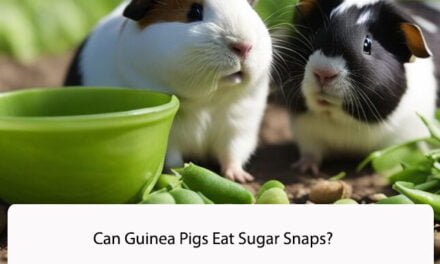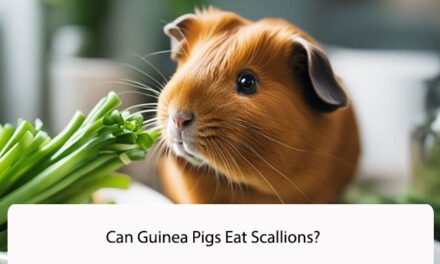Guinea pigs are adorable and beloved pets that require a balanced and nutritious diet to thrive. As responsible pet owners, we want to ensure that we are feeding our furry friends the right foods to keep them healthy and happy. One popular human snack that many pet owners wonder about is graham crackers. Can guinea pigs eat graham crackers?
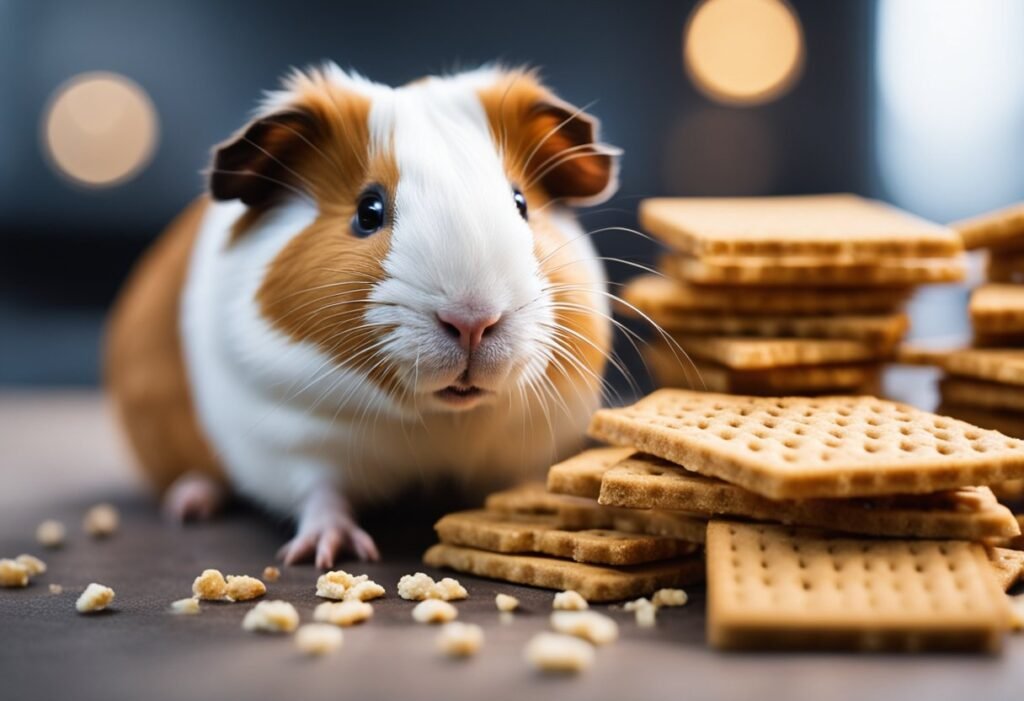
Graham crackers are a type of sweet, crunchy cookie made from graham flour. While they may be a tasty treat for humans, it is important to consider whether they are safe and healthy for our guinea pigs to consume. In this article, we will explore the nutritional value of graham crackers and examine whether they are a suitable food for guinea pigs. We will also discuss the potential risks and benefits of feeding graham crackers to our furry friends.
Can Guinea Pigs Eat Graham Crackers?
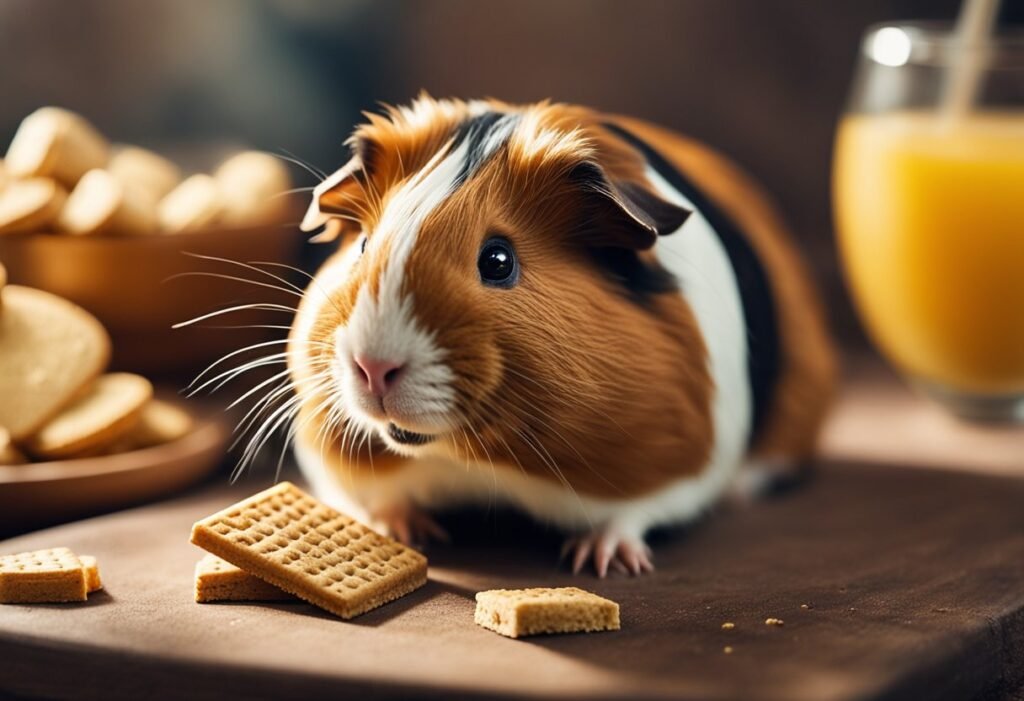
Graham crackers are a popular snack among humans, but can guinea pigs eat them too? As responsible pet owners, we want to make sure that we are feeding our furry friends a healthy and balanced diet. In this section, we will explore whether or not it is safe for guinea pigs to consume graham crackers.
Graham crackers are made from wheat flour, sugar, and oil, which are all ingredients that are not recommended for guinea pigs. These ingredients can upset their digestive system and cause health problems such as diarrhea and bloating. Additionally, graham crackers are high in carbohydrates and low in fiber, which is not ideal for guinea pigs.
It is important to note that guinea pigs have specific dietary requirements that should be met in order to keep them healthy. They require a diet that is high in fiber, low in fat, and rich in vitamin C. While graham crackers may seem like a harmless treat, they do not provide any nutritional benefits for guinea pigs.
In conclusion, guinea pigs should not be fed graham crackers. As responsible pet owners, we should provide our furry friends with a diet that is specifically designed for their nutritional needs. Instead of graham crackers, we can offer our guinea pigs fresh fruits and vegetables as a healthy and tasty snack.
Understanding Guinea Pig Diet
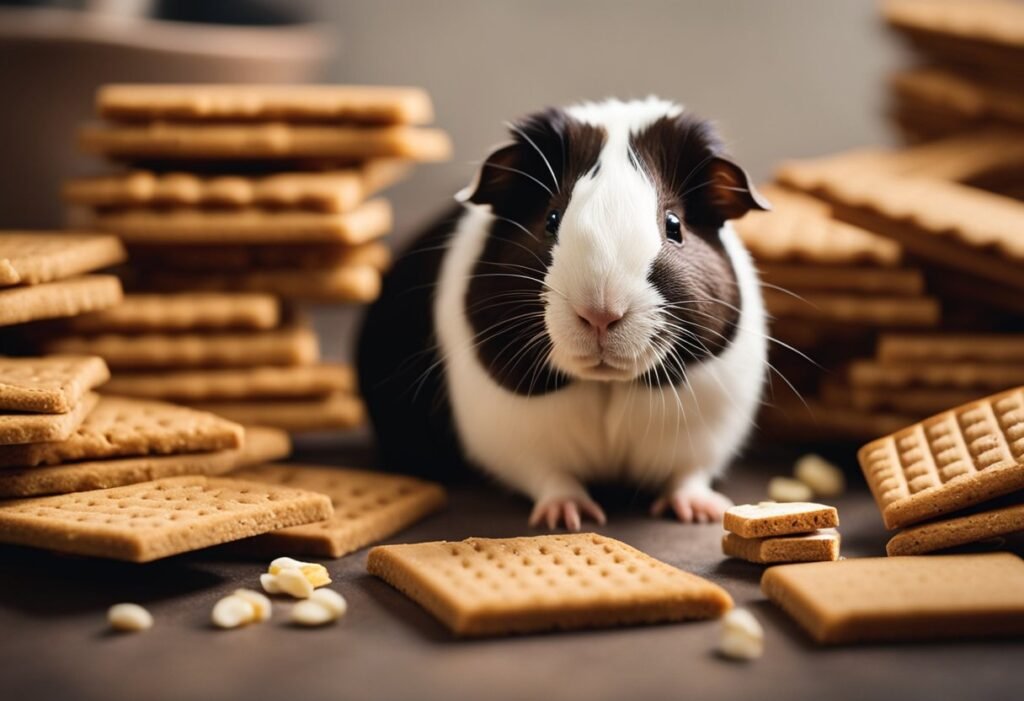
Guinea pigs are herbivores, which means they only eat plants. They require a diet that is high in fiber and vitamin C. In the wild, guinea pigs eat grasses, herbs, and leafy greens. As pets, they should be fed a diet that mimics their natural diet as closely as possible.
Basic Nutritional Needs
Guinea pigs require a diet that is high in fiber. This helps keep their digestive system healthy and prevents digestive problems. They also require vitamin C, which is essential for their overall health. Guinea pigs cannot produce vitamin C on their own, so they must get it from their diet.
In addition to fiber and vitamin C, guinea pigs require a balanced diet that includes protein, carbohydrates, and fats. It is important to provide them with a variety of foods to ensure they are getting all the nutrients they need.
Common Foods for Guinea Pigs
There are many foods that are safe for guinea pigs to eat. Some common foods include:
- Hay: Timothy hay, orchard grass hay, and alfalfa hay are all good choices for guinea pigs. Hay should make up the majority of their diet.
- Pellets: Guinea pig pellets are specially formulated to provide all the nutrients they need. Look for pellets that are high in fiber and vitamin C.
- Vegetables: Guinea pigs can eat a variety of vegetables, including carrots, bell peppers, cucumbers, and leafy greens like kale and spinach.
- Fruits: Guinea pigs can also eat fruits, but they should be given in moderation because they are high in sugar. Good choices include apples, strawberries, and blueberries.
It is important to avoid feeding guinea pigs foods that are high in sugar, fat, or salt. This includes processed foods like graham crackers, which should not be a part of their diet.
Possible Risks of Graham Crackers
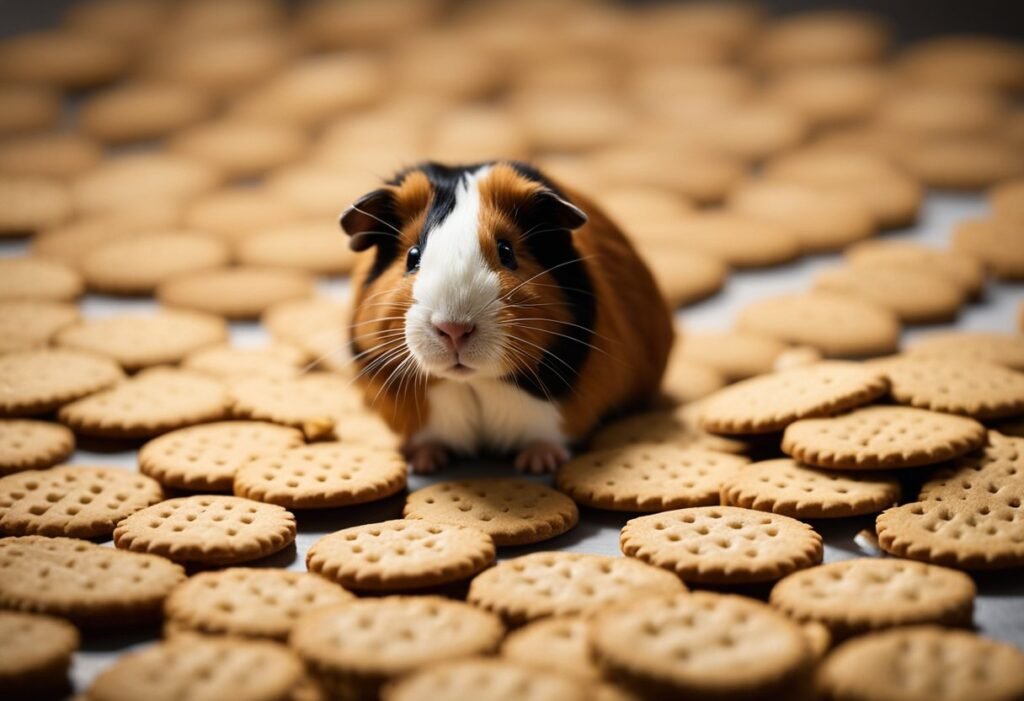
Graham crackers are a popular snack among humans, but can guinea pigs eat graham crackers? While it is not toxic for guinea pigs to eat graham crackers, there are some risks associated with feeding them to your furry friend.
High Sugar Content
Graham crackers are high in sugar, which can lead to obesity and other health problems in guinea pigs. Guinea pigs have a sensitive digestive system, and feeding them foods high in sugar can cause diarrhea and other gastrointestinal issues.
Lack of Nutritional Value
Graham crackers do not provide any nutritional value to guinea pigs. They are low in fiber, protein, and other essential nutrients that guinea pigs need to stay healthy. Feeding your guinea pig a diet high in sugary treats like graham crackers can lead to malnutrition and other health problems.
In conclusion, while it is not toxic for guinea pigs to eat graham crackers, it is not recommended to feed them to your furry friend. There are many other healthy and nutritious treats that you can give your guinea pig instead.
Healthy Alternatives to Graham Crackers
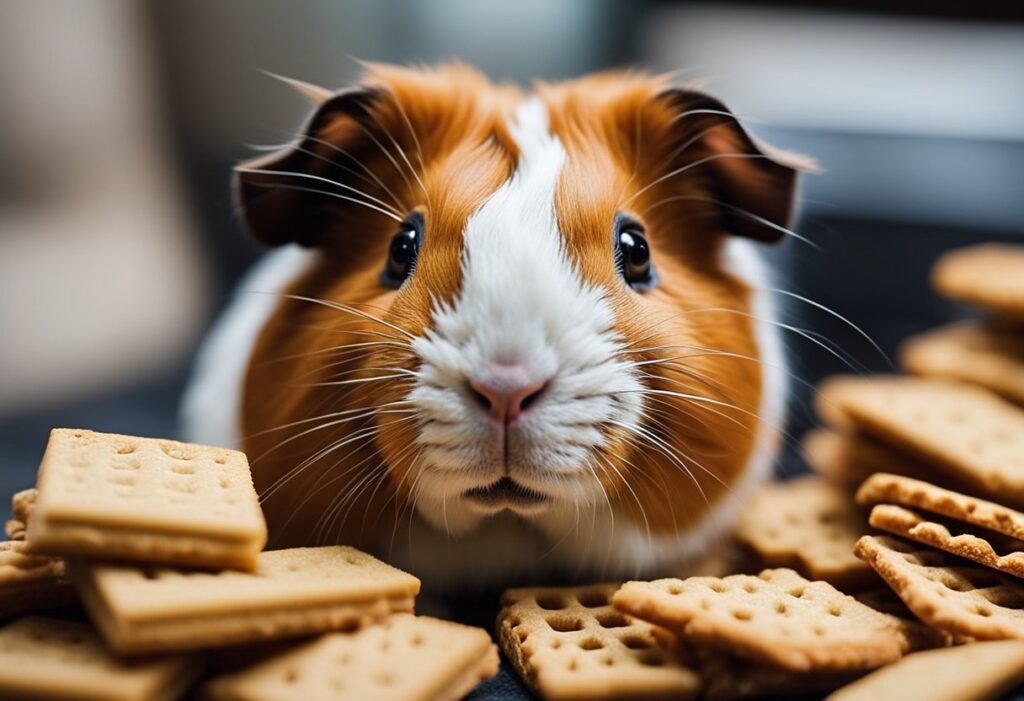
If you’re looking for a healthy snack alternative for your guinea pig, here are some options to consider.
Fresh Vegetables
Fresh vegetables are a great source of vitamins and minerals for your guinea pig. Some good options include:
- Carrots
- Cucumber
- Bell peppers
- Broccoli
- Cauliflower
- Kale
- Spinach
- Romaine lettuce
Be sure to wash the vegetables thoroughly and cut them into small pieces before feeding them to your guinea pig.
High Fiber Foods
High fiber foods are important for maintaining your guinea pig’s digestive health. Some good options include:
- Timothy hay
- Oat hay
- Orchard grass
- Alfalfa hay (in small amounts)
- Fresh herbs (such as parsley and cilantro)
- Pellets made specifically for guinea pigs (look for ones with high fiber content)
When choosing pellets, be sure to read the ingredients list carefully and avoid ones with added sugars or artificial colors.
Remember, while it’s okay to give your guinea pig treats like graham crackers occasionally, it’s important to make sure the majority of their diet consists of hay, vegetables, and pellets.
Consulting a Vet for Dietary Advice
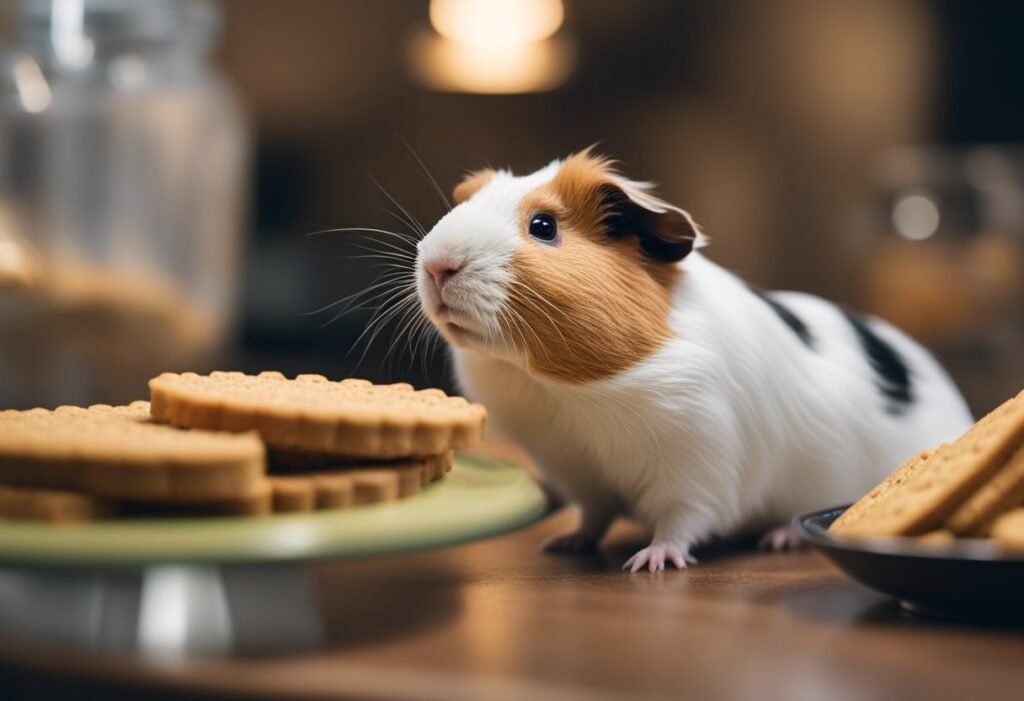
When it comes to feeding your guinea pig, it’s always best to consult with a veterinarian for advice. While graham crackers may seem like a harmless treat, it’s important to ensure that your pet is receiving a balanced diet.
A vet can provide guidance on what types of foods are safe for your guinea pig to consume, as well as how much and how often they should be fed. They can also help you identify any potential health issues that may be related to your pet’s diet.
In addition, a vet can recommend specific brands or types of food that are nutritionally balanced and appropriate for your guinea pig’s age and health status. They may also suggest supplements or other dietary adjustments to ensure that your pet is getting all the nutrients they need.
Overall, consulting with a vet is an important step in keeping your guinea pig healthy and happy. By working together, you can ensure that your pet is receiving the best possible care and nutrition.
Frequently Asked Questions
What foods should be avoided when feeding guinea pigs?
There are several foods that should be avoided when feeding guinea pigs, including chocolate, caffeine, alcohol, garlic, onions, and dairy products. These foods can be harmful to guinea pigs and should be kept out of their diet.
What is the recommended diet for guinea pigs?
The recommended diet for guinea pigs includes hay, fresh vegetables, and a small amount of pellets. Guinea pigs require a high-fiber diet, and hay should make up the majority of their food intake. Fresh vegetables, such as leafy greens and bell peppers, can be given daily to provide additional nutrients.
Is peanut butter safe for guinea pigs to eat?
Peanut butter is not recommended for guinea pigs. It is high in fat and sugar, which can lead to health problems such as obesity and dental issues.
Can guinea pigs eat rice as part of their diet?
Rice can be given to guinea pigs in small amounts as a treat, but it should not be a regular part of their diet. Guinea pigs require a high-fiber diet, and rice does not provide enough fiber.
Should eggs be included in a guinea pig’s diet?
Eggs are not recommended for guinea pigs. While they are a good source of protein, they are also high in fat and cholesterol, which can be harmful to guinea pigs.
What human snacks are safe for guinea pigs to eat?
Some safe human snacks for guinea pigs include small pieces of apple, carrot, and cucumber. However, these snacks should only be given in small amounts and should not replace their regular diet. It is important to avoid giving guinea pigs sugary or fatty snacks, as they can lead to health problems.


